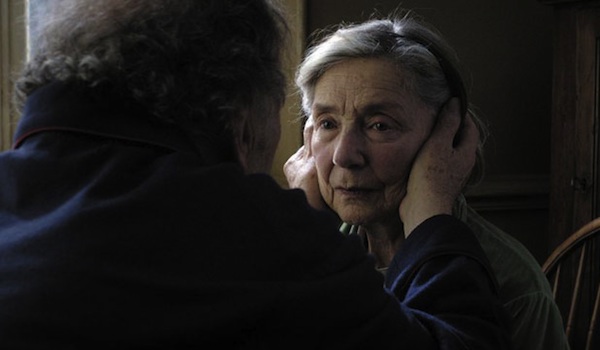Amour Review
One has to be prepared for the kind of cinematic masochism that comes with watching a Michael Haneke film before sitting down to his latest, the Best Picture-nominated Amour. But while brutal, this film is almost nothing like the Austrian auteur’s previous work. Everything that’s gruesome comes back to intense sorrow, not blood and guts, and as such, it’s a pair of expert performances from two true thespians that hook you in and break your heart.
Anne (Emmanuelle Riva) and Georges (Jean-Louis Trintignant) are a happily married pair of octogenarians—retired music teachers living in a lovely French loft. They live ordinary enough lives, but over breakfast one morning, Anne suddenly turns unresponsive. For minutes, Georges tries to snap her out of his scary fog before she finally comes back to him. This event, however, will forever change Anne and Georges’ lives.
The diagnosis: stroke. She undergoes a procedure that could prevent future strokes, but it’s unsuccessful, and not long thereafter, she suffers another that paralyzes her right side. She’s reliant on Georges—not just for companionship, but for simple tasks like going to the bathroom. And it’s all downhill from here, as episode after episode leaves her less and less able to function.
The worse things get, the more Anne speaks of wanting to die. She makes Georges promise early on that he won’t commit her to a hospital or long-term care facility. Yet, the perceived ignobility of a body that’s simply withering away is too much for her to handle. When Georges gives her water to drink, she purses her lips—unwilling to accept this life-sustaining substance. When he forces the water in, she spits it out. When he slaps her for rebelling like this, both feel utterly defeated.
This is just one of many indescribably tough-to-watch sequences anchored by the devastating work of Riva and Trintignant. The former, of course, became the oldest women to receive an Oscar nomination for Best Actress, and it’s easy to see why she earn the lion’s share of the film’s praise. Hers is the bigger of the two performances. The 86-year-old gives herself over physically and emotionally to the role in a way no one else did in 2012.
Trintignant, not unlike Gordon Pinsent in Away from Her, found himself squeezed out of the Best Actor race by a role that’s, by design and necessity, less showy. That’s not to say he isn’t exceptional—on the contrary, his way of conveying a kind of deflated stoicism is essential to both the film’s verisimilitude and our emotional peace of mind. In other words, he handles this situation like one my expect, yet he puts on a brave face for both his dying wife and the quivering viewer.
The third gold star here goes to Haneke—not only for managing his actors, but also for imbuing the world they inhabit with class and dignity. His is a static camera. He favors long takes, which give Riva and Trintignant the opportunity to flex some creative muscle with their respective acting choices. The long takes also afford us the opportunity to explore and understand the enclosed world they inhabit. As much is said about the last 80 years of Georges and Anne’s life together with three quick shots of decorations and other things inhabiting their apartment than is said with one of many long soliloquies. Of course, this also leads to a few too many drawn out sequences, but by and large, Amour is appropriately and acceptably paced.
To say this film isn’t for everyone is an understatement. While not impossibly heartbreaking (thanks to Haneke’s insistence on treating his characters and their predicament with love and respect), it’s still ultimately about an old women’s slow and painful march toward death. But a more thoughtfully composed film you won’t find this year, nor most others.
















